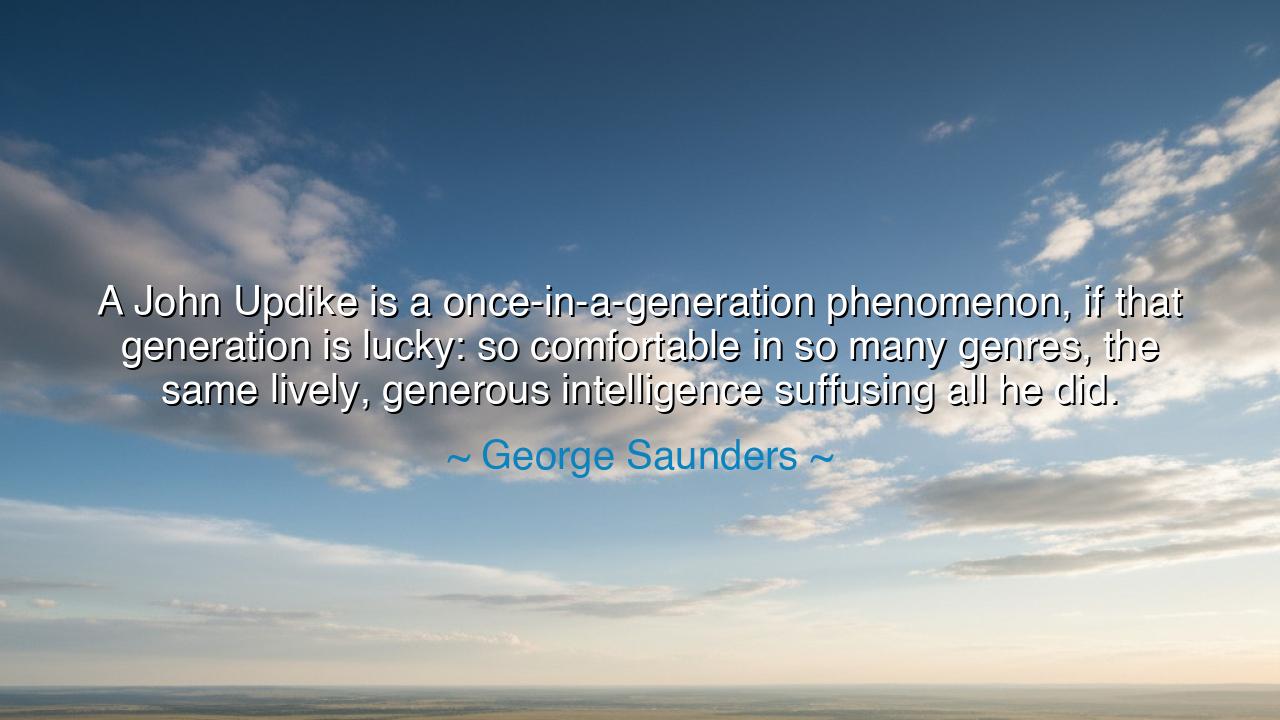
A John Updike is a once-in-a-generation phenomenon, if that
A John Updike is a once-in-a-generation phenomenon, if that generation is lucky: so comfortable in so many genres, the same lively, generous intelligence suffusing all he did.






The words of George Saunders, “A John Updike is a once-in-a-generation phenomenon, if that generation is lucky: so comfortable in so many genres, the same lively, generous intelligence suffusing all he did,” stand as both praise and prophecy. In them resounds not merely admiration for one man, but reverence for the rare mind—that luminous spirit which appears only when the heavens align, when a generation, through grace or fortune, is granted such a voice. Saunders speaks as one artist honoring another, yet beneath his tribute lies a universal truth: that genius, when joined with generosity, becomes something far greater than talent—it becomes legacy.
John Updike, the subject of this exaltation, was a master of letters—novelist, poet, essayist, and critic. He moved through the vast landscape of the written word as one who walks through his own homeland, at ease in every field, fluent in every tongue. To say he was “comfortable in many genres” is to say that he possessed the rarest gift: intellectual harmony, where imagination and discipline dance as one. Updike’s art was not confined by form; he found poetry in prose, philosophy in fiction, and divinity in the mundane. Saunders recognized that this ease did not come from arrogance, but from lively intelligence—a spirit so curious and so generous that it could illuminate everything it touched.
Such a figure, as Saunders declares, is not common. He is a once-in-a-generation phenomenon, an embodiment of the ideal that human potential, when nurtured, can approach the divine. History offers but few such lights: Leonardo da Vinci, who painted, invented, and dreamed; Goethe, who bridged science and poetry; Michelangelo, who carved eternity into marble and fresco alike. These were souls who refused to live within one discipline—they saw the world as one tapestry, each thread leading to another truth. To them, all creation was one act, all art one prayer. So it was with Updike: his pen did not separate the sacred from the profane, but showed that both lived in the same breath.
And yet, Saunders does not speak of brilliance alone—he speaks of generosity. For in Updike’s writing there was a gentle compassion, a willingness to understand rather than to judge, to describe humanity in all its flaws yet never deny its beauty. This is the mark of true greatness. Many possess intellect; few possess heart. Many can write with precision; few can write with grace. To have intelligence suffused with kindness is to give one’s light not for display, but for illumination—to share wisdom as warmth rather than weapon. In this, Updike was not only a writer, but a sage of the modern age.
The ancients knew such spirits well. In the time of Athens, there was Socrates, whose questioning mind sought truth not for conquest but for enlightenment. He, too, had that lively, generous intelligence, that rare ability to lift others through thought, to make others wiser simply by engaging them. As with Updike, his genius was not selfish—it was shared, scattered like seeds to grow in others. And from such men, entire civilizations were nourished. So too does Saunders remind us: when a generation is blessed with a mind like Updike’s, it is not for admiration alone, but for inheritance—for the responsibility to learn, to emulate, to continue.
Thus, the meaning of Saunders’ words extends beyond praise. He speaks to the responsibility of the living. For every age receives its teachers, its poets, its visionaries, and it must decide how to honor them—not merely with monuments or memory, but by carrying forward their spirit of curiosity, craft, and compassion. To witness greatness is not enough; one must learn from it. Each reader, each artist, each thinker must ask: How can I live more intelligently, more generously, more fully aware of the beauty that breathes through all things?
So let the lesson be this: true intelligence is not mastery, but magnanimity. The one who learns many crafts yet serves the truth of them all; the one who creates not for vanity but for communion—such a person becomes timeless. If we would honor the Updikes and the da Vincis, the minds that grace our generations, we must live as they did: ever curious, ever kind, ever devoted to the work of understanding life in all its forms.
And when future generations look upon us, may they too say, “They were a rare people—comfortable in many pursuits, with a generous intelligence suffusing all they did.” For this is the truest tribute to genius: not imitation, but continuation—the flame passed from one age to the next, never dimmed, always burning with that same lively, generous intelligence that makes humanity worthy of its dreams.






AAdministratorAdministrator
Welcome, honored guests. Please leave a comment, we will respond soon